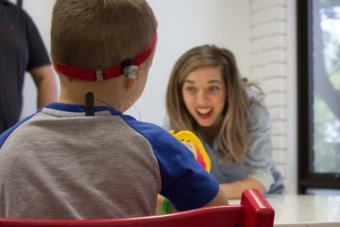Blog
-

Preschool and therapy are important keys to preparing children with hearing loss to start school.
 23 Feb , 2017
23 Feb , 2017
Samuel Koschel is like any other four-year-old; he plays soccer, swims and his favourite pastime is a close tie between chasing bugs in the yard or playing with his pet dog Watson.
He enjoys and communicates about such everyday things that his mother Stacey sometimes “forgets” that Sam only has one good ear.
“We treat him the same as we would even if he had two good hearing ears,” she said.
Sam was born with microtia — a deformation of the external ear — and a unilateral hearing loss.
He uses a bone-anchored hearing aid (BAHA) that vibrates sound through his skull and cochlea to his inner ear.
“We encourage people to ask questions to Sam about his ‘little ear’, which he normally answers with:
‘I was born like this’,” Ms Koschel said.Sam could have started kindergarten this year — he turns five next month — but the Koschels decided to give him an extra year of preschool to develop his speech, language and social skills.
He attends preschool three days a week as well as therapy sessions at the Shepherd Centre in Newtown, which runs early intervention programs and classes to help deaf students transition into mainstream schools.
The centre this year had 47 graduates enter mainstream primary schools.
Developing language and social skills.
In one of Sam’s therapy sessions, he was tested on his ability to hear the seven sounds such as sh, th and ss.
This year he will also learn classroom skills such as trying to isolate the person talking in a room full of noise, know when to tell his teacher when something isn’t right with his hearing device, and learn how to talk to his peers about his hearing.
“We wanted Sam to go to the same school as his big brother Max,” Ms Koschel said, adding that there was a lot of preparation involved.
“There’s so many [considerations], devices that he’ll be hearing through, other devices that attach to [the BAHA].
“We have to make sure the teachers are willing to cooperate and you need to educate and advocate for your child — make sure your child gets what he’s entitled to and implement it into any school program.”
Jim Hungerford, chief executive of the Shepherd Centre, said children needed to be able to advocate and speak up for themselves when they started school, as well as handle the flurry of questions that would inevitably come from their peers.
“Preschool is very important for all children because it’s that early learning framework,” he said.
“For children with hearing loss, they have a lot of extra challenges.
“We often suggest a child uses an FM receiver.
“The teacher will have a microphone on them and the microphone communicates directly to the hearing device the child has and that bypasses all the noise of the classroom and the chatter around them.”
Samuel has his hearing tested every six months and attends monthly therapy sessions.
Source: ABC Radio, Sydney
Image credit: ABC Radio, Amanda Hoh, Samuel Koschel





























































































































































































































































































































































































































































































































































































